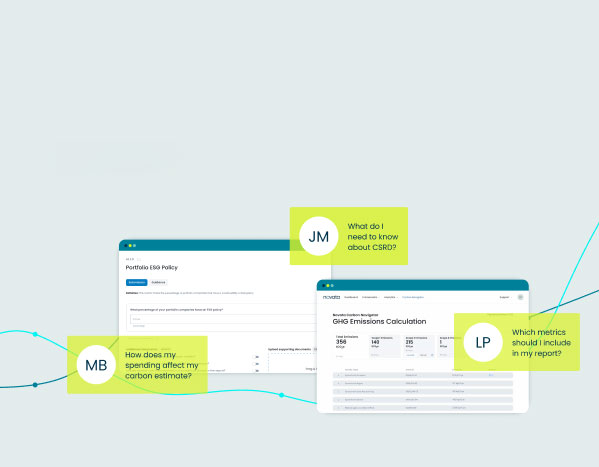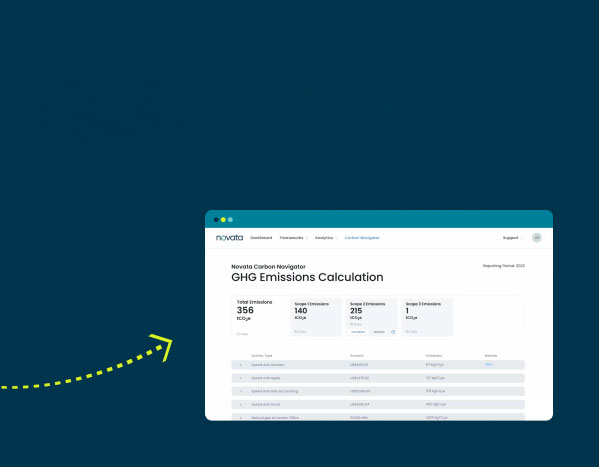The surge in increasingly complex, prescriptive, and sometimes conflicting ESG-related regulations has made compliance a challenge in the private markets. The struggle for due diligence is further magnified for multinational firms that must navigate not just one but multiple regulatory environments, each with its respective nuances. With an EY study revealing that 55% of finance professionals still rely on spreadsheets and manual processes for ESG data management, the need for more sophisticated, efficient tools to keep pace with large-scale reporting requirements has never been more pressing.
Deploying a dedicated ESG data software solution can simplify the complexities of sustainability reporting. However, finding the right ESG tool means seeking a platform that resonates with an organization’s specific sustainability objectives and business needs, whether it’s to enhance reporting accuracy, improve portfolio performance, or generate long-term value creation. To help users ascertain the best ESG data software solutions for their needs, we’ve identified seven key features to consider while evaluating ESG data tools.
1. Extensive Data Management and Reporting Systems
Accurate, reliable ESG data is the cornerstone of effective ESG reporting. However, fragmented data sources and poor data hygiene remain prevalent challenges for private markets, leading to frustrating data collection processes and compromised report findings.
A centralized repository can address the challenges of disjointed datasets by streamlining the collection and management of ESG data on a single, secure platform. An ESG data software solution streamlines the collection of qualitative and quantitative data. Look for a platform with built-in guardrails for data input to ensure that foundational data is accurate, current, and correctly classified, greatly reducing errors and the need for manual oversight. Automating the data collection process also enables data traceability, which is critical for establishing data transparency and audit readiness.
Consider key features like comprehensive dashboard overviews, data visualization tools, and robust metric libraries, all of which can provide access to real-time performance tracking and analysis.
2. Simplifies and Strengthens Regulatory Compliance
In an ever-shifting ESG landscape where regulations such as the Corporate Sustainability Reporting Directive (CSRD) are being introduced, firms have to anticipate how rising developments are affecting their sustainability strategies as well as compliance obligations. As the requirements of ESG metrics expand in volume and complexity, investors need to consider a more efficient way to address these emerging reporting needs.
An ESG data platform alleviates this burden by providing firms with the tools to align with multiple global regulatory standards and frameworks, ensuring they remain compliant wherever they operate. The system can integrate new reporting templates or metrics to help ensure firms meet disclosure requirements for compliance. Some platforms may even have dedicated reporting capabilities, such as Novata’s expanded SFDR solution. With 42% of global CEOs admitting that they were “struggling to articulate a compelling ESG story” to their stakeholders, an ESG data platform can empower firms to confidently prepare data for disclosures and communicate progress to stakeholders.
3. Provides Data-Driven Actionable Insights
Aside from streamlining the data collection process, a good ESG data platform should also provide users with the tools to transform raw data into powerful levers of value creation. For example, the ability to benchmark performance against industry peers and provide detailed data analysis is critical in the private markets.
Firms rely on these insights to pinpoint underperforming portfolios, assess risk areas that may adversely impact financial value, and identify new ESG-aligned opportunities for improved capital allocation. These data-driven insights then inform the actions needed for improvements. Ensure that the software has transparent, defined data benchmarking methodologies to help firms demonstrate their commitment to ESG and set new standards for performance.
4. Integration With Existing Systems
When evaluating potential software systems, it is important to consider how the platform fits into your existing tech stack. An ESG data management platform should improve your existing workflow, making it easy to optimize processes without creating undue burden on users.
Software interoperability is often an overlooked aspect of tech implementation, and some platforms may offer integrations with your existing technology to enable better data flow and accessibility for end-to-end ESG data management. Keep in mind that raw data from one system may still take some work to be relevant for ESG insights. Therefore, look for a platform that has the functionality to work with other reporting systems as well as the capabilities to translate the data in a way that is relevant from an ESG perspective. Having a robust view of sustainability data provides better insight into material ESG topics and areas of risk across the portfolio.
5. User-Friendly, Intuitive Interface
Regardless of how functional or advanced an ESG data platform is, firms are not maximizing the returns from their tech investment if the targeted users are not putting it to use. A user-friendly, intuitive interface works wonders to encourage widespread user adoption rates, bringing greater workflow efficiency and productivity. Opt for user-centric features like customizable dashboards, responsive user experiences, and inclusive design to minimize barriers to entry.
Portfolio companies may also lack the resources or expertise required to collect ESG data seamlessly and effectively. It is worth noting that GPs are prioritizing ease of use as a major consideration when evaluating software solutions for their portfolios.
6. Stringent Data Security
Private equity firms are entrusted with massive troves of confidential and proprietary ESG information, including environmental impact assessments, employee records, and supply chain data. Data security is paramount when selecting ESG data software, as any breaches will have significant reputational and financial ramifications. Safeguard ESG data with rigorous security measures such as data encryption and role-based access controls to secure data integrity. Ideally, the software should also adhere to global data protection standards, such as being ISO 27001 certified, to foster greater trust and assurance with investors and portfolio companies.
7. Vendor Support Availability
Vendor support shouldn’t end after a successful platform rollout. Without ongoing support, some users may feel abandoned after onboarding or are left without sufficient knowledge to confidently use the platform or navigate the complexities of the ESG space. Look for a collaborative partnership that extends beyond the initial implementation, with robust support and deep industry expertise to assist firms at every stage of their ESG journey.
Review the support services offered by the platform, including the availability of customer support teams, access to training resources, and assistance with navigating the platform or in the event of software disruptions. For example, Novata’s customer success team works closely with an in-house team of ESG experts to ensure customers are maximizing their ESG investment for impactful business outcomes.
Choose an ESG Data Platform That’s Right for You
Implementing the right ESG data tool can be game-changing for private equity firms looking to elevate their sustainability initiatives. However, the selected solution should cater to firms at various ESG maturity levels and ultimately make data reporting an easy and practical process.
Designed to help GPs and private companies at every stage of their ESG journey, Novata offers a clear and streamlined way to collect, measure, and report the ESG metrics that matter most to firms. The platform merges cutting-edge, innovative technology with expert guidance to create a user-centric experience that enables firms to understand, enhance, and share their sustainability data story with confidence.
Below are a few of Novata’s key platform features:
- An extensive metric library featuring over 1,100 metrics, including the flexibility to add custom metrics and guidance on selecting the metrics that matter
- The broadest collection of private markets’ ESG benchmarks, ranging from 350 sector benchmarks and 75 universal benchmarks
- Dedicated sustainability reporting capabilities with Novata’s in-platform SFDR solutions and Carbon Management tools
- ISO 27001 certified and SOC2 Type II compliant across the trust principles of Security, Confidentiality, and Availability.
- In-house ESG expertise (Novata Services) and around-the-clock Customer Success team for expert support and guidance
Ready to take the next step in your ESG journey? Request a demo or get in touch with one of our experts to learn how Novata can be tailored to your firm’s needs.






